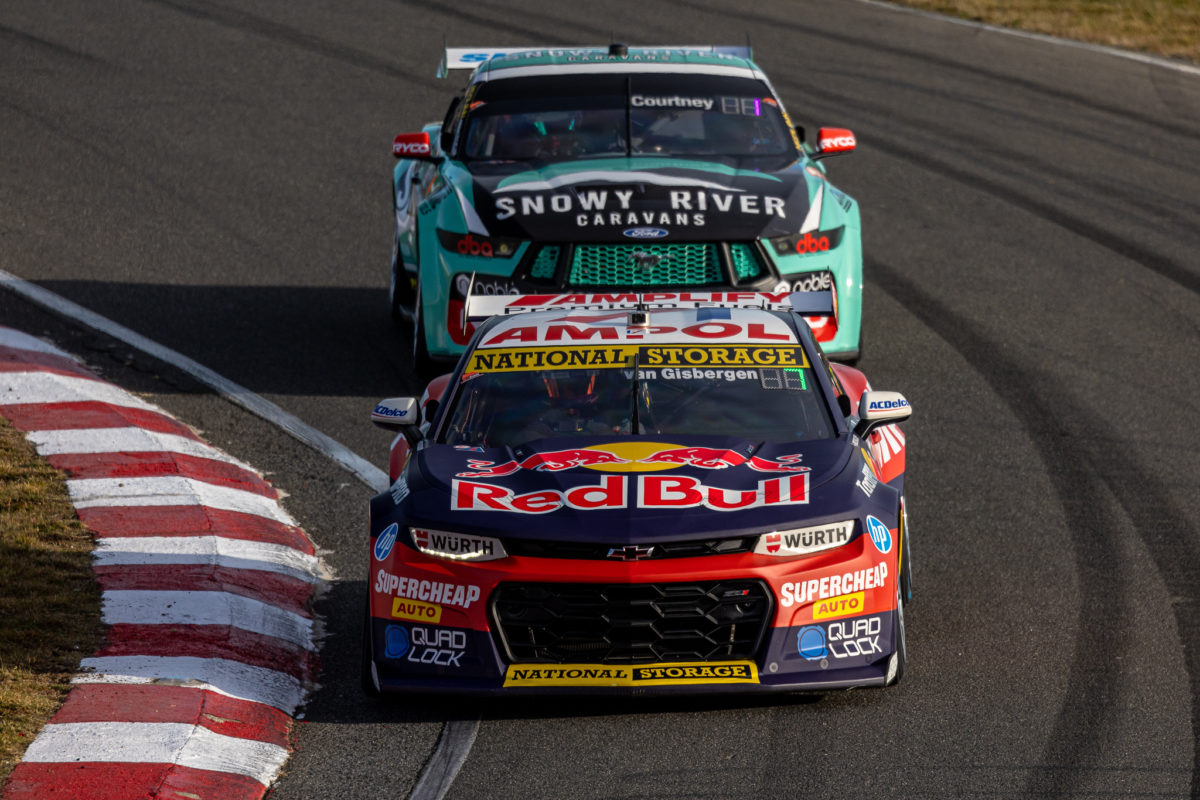

Triple Eight Team Principal Jamie Whincup hopes and expects that Supercars will not make changes on the basis of “white noise” around parity.
Ahead of this weekend’s Betr Darwin Triple Crown, Chevrolet Camaros, including those fielded by Triple Eight Race Engineering, have won 11 of the 12 races held this year and been first to the chequered flag in the other Gen3 encounter to date.
Unsurprisingly, it has led to claims that there must not be technical parity between the Camaro and the Ford Mustang or, from those on the Blue Oval side who have spoken with less certainty, suggestions that a disparity is likely/apparent/possible.
Whincup, boss of the Chevrolet homologation team, urged that if changes are implemented, that they be made due to a lack of parity being established rather than because on-track results.
“We’re pro-parity and we’re absolutely fine if someone has got an error with something, that we allow them to get it fixed,” he told Speedcafe.
“If there’s a problem, then let’s fix the problem; we’re not trying to block anything like that.
“We’ve just played a complete straight bat. We presented our car early – car and engine – we did all the testing, played a straight bat, and we delivered a car, so we’ve been quite proud of the way we’ve run the process.
“I believe Supercars have done a really good job as well. They’ve used all the tools they had available, and they’ve done a very, very good job.
“All the testing they’ve done, there’s absolutely no indication that there’s a parity issue. In fact, there’s all the indications to show that the cars are that close, it’s ridiculous.
“But if somebody thinks otherwise, then let’s do more testing.
“What we can do is work on numbers and facts, not opinions and whatnot, and we’re strictly not a BoP category, so we don’t make adjustments because of the results on track.
“Anyone that wants to debate the parity thing one way or the other via on-track results, it’s completely flawed, because that’s not what we’re about.
“So, put the cars on the dynos, do roll-centre testing, do aero testing, do all of the things that Supercars have already done, and get the numbers, and if the numbers aren’t right, then we’ll adjust.
“But if the numbers are right, don’t adjust. Don’t adjust because it doesn’t feel right; we don’t do that.
“Overall, we’ve played a straight bat and I think Ford have done the same thing and Supercars have done a great job.
“There’s just white noise around, but you don’t adjust things because of white noise; you adjust things because of numbers.
“But if the other side think they’ve got a problem, we’re okay for them to fix the problem, but come to us with numbers and facts, not ‘we haven’t had the results we thought we were going to have.’”
Whincup’s comments come amid Supercars’ investigation into the possible use of a transient dynamometer in Melbourne, and the ordering of torque sensors, which could appear as soon as next month’s NTI Townsville 500.
Both initiatives would provide a more rigorous measurement of engine performance, and answer the question as to whether or not there is a transient disparity.
Like the Triple Eight boss, Ford’s global motorsport chief, Mark Rushbrook, has noted that “on-track results are not necessarily representative of technical parity.”
However, Rushbrook is a proponent of transient dynamometers, reasoning that they are an important tool in developing an engine.
Whincup says he has “trust that Supercars won’t adjust on white noise” but pointed also to the fact that it is incumbent upon the homologation team to present a competitive car.
“The [Teams Racing] Charter says it’s the homologation team’s responsibility to present a car fit to test, so that’s what we did,” he remarked.
“If the other side think they haven’t presented the right thing, then in some way that’s their problem.
“But once again, we’re not saying, ‘Hey, we’ve done the testing, you’re locked in.’
“We’re not that; we’re pro-parity and we’re pro if someone thinks they’ve got a problem, we’ll allow them to fix it, but you’ve got to come to us with the numbers.”
It is expected that the Mustangs will race with another new engine map this weekend, although Rushbrook believes the now frequent calibration changes are an interim measure rather than a long-term solution.
Practice 1 at Hidden Valley starts on Friday at 10:45 local time/11:15 AEST.




















Discussion about this post